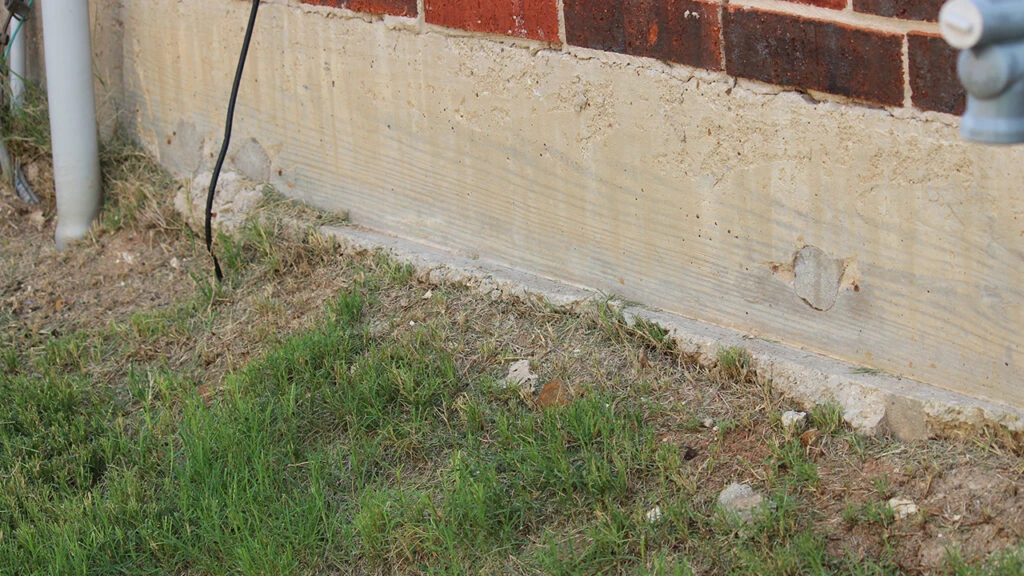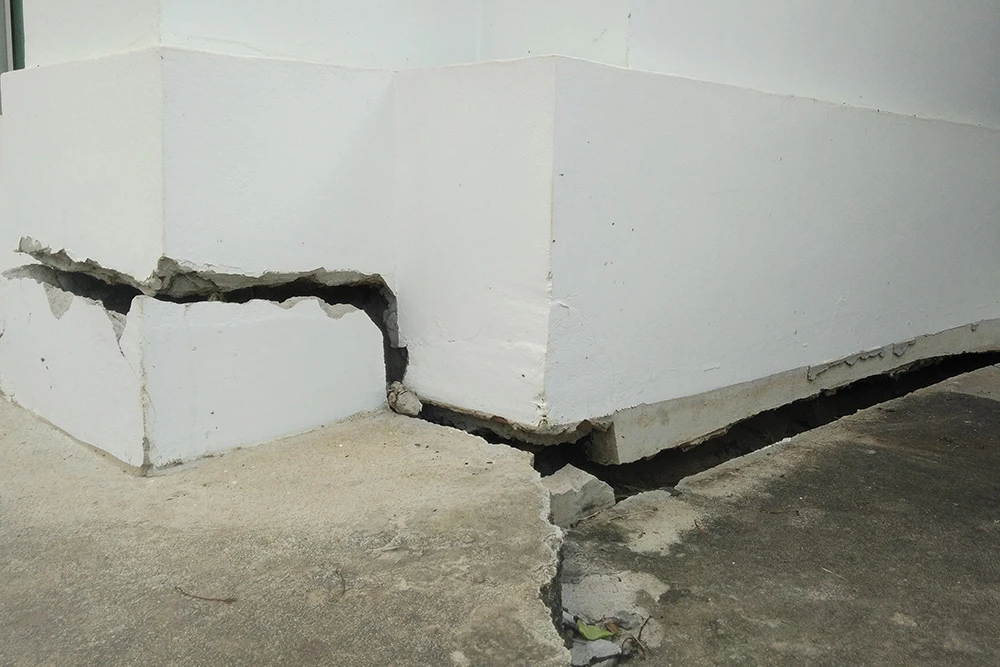
Did you know that 90% of homes in the USA were designed without the involvement of a structural engineer?
Your home is more than just a place of residence; it’s a significant investment and a sanctuary for you and your loved ones. However, the very foundation that your home rests upon can become its most vulnerable point, potentially leading to costly repairs and unsafe living conditions if neglected.
In this comprehensive guide, we will walk you through the critical signs of foundation damage, share preventative strategies to guard against these issues, and explore effective solutions to ensure your home remains the safe haven it was meant to be.
A house with foundation problems shouldn’t be a major stress in your daily life, or a deal breaker in real estate transactions. The best way to avoid getting stuck with a house with a bad foundation, is to trust a competent structural engineer.
Foundation Problems
Foundations are essential to the structural integrity of a house, serving as the base that supports everything above. However, several factors can compromise this integrity, leading to foundation issues. Understanding the causes of foundation issues is the first step toward prevention and effective foundation repair.
Common Causes of Foundation Problems
- Unstable Soil: Different types of soil have varying load-bearing capacities. Expansive clay soil, for example, can swell with moisture and shrink when dry, causing the foundation to shift.
- Poor Drainage: Excess moisture around the foundations can lead to soil expansion, while inadequate drainage can cause erosion, both of which affect foundation stability.
- Thermal Expansion: Changes in temperature can cause concrete to expand and contract, leading to cracks over time.
- Tree Roots: Roots from large trees can extend under a foundation, causing it to lift or crack.
- Poor Construction: Substandard building practices or the use of inferior materials can result in a bad foundation that is prone to damage. The main cause of this is poor design by somebody not professionally trained to design foundations.
- Water Intrusion: Water leaking into foundations, often through cracks, poor waterproofing or drainage issues, can weaken the structure over time.
- Inadequate design: Foundations and repairs inadequately designed by contractors and foundation repair salesmen are the most common cause of foundation failure across the US.

Signs of Foundation Problems
Identifying the early sign of a foundation problem can save homeowners from more severe damage and expensive repairs. Here are common signs to watch for:
- Diagonal Cracks: These often appear on walls or around windows and doors and can indicate shifting foundations.
- Uneven Floors: Sagging or bouncing floors are a clear sign of foundation settlement.
- Sticking Doors and Windows: Difficulty opening or closing exterior and interior doors and windows can be signs of foundation problems. This may be loose hinges
- Interior Wall Cracks: if you notice small cracks in interior walls, especially near door frames and windows, it can signal foundation issues.
- Exterior Wall Cracks: Large cracks in brickwork or siding are often indicative of significant foundation movement.
- Foundation Sinking: Noticeable sinking of the foundations on one side of the house can lead to an uneven structure.
- Visible foundation upheaval: This is a particularly dangerous situation as it normally means problems elsewhere in the foundations or support structure of your home and will require a detailed inspection be a qualified engineer.
Foundation Repair (Opt for an Engineer, Not a Salesman)
When it comes to repairing foundation issues, it’s crucial to seek the expertise of a structural engineer rather than relying on solution salesmen who may push one-size-fits-all fixes.
Homeowners often mistake foundation repair businesses and salesmen for structural engineers. They are under the impression that they are getting sound structural input, while behind the scenes they are often paying a premium for an inferior, or unsuitable product.
The integrity of your home depends on tailored solutions that address the specific causes and conditions affecting your foundation. Be aware of the contractor that sells you a specific brand or a company standing by a one-size-fits-all solution. Ensure that you’re getting the best advice, directly from a qualified structural Engineer.
Why Choose a Structural Engineer?
- Accurate Assessment: Engineers can accurately diagnose the root cause of a foundation problem, whether it’s unstable soil, poor construction, or water intrusion.
- Customized Solutions: They provide tailored repair plans that address the specific issues of your home, avoiding generic fixes that may not be effective.
- Long-term Stability: Engineer-recommended repairs are designed to offer long-term stability and prevent recurring problems.
- Cost Efficiency: Although the initial cost might be higher, customized solutions save money in the long run by avoiding further damage and repeated repairs.
Risks of Generic Solutions
- Ineffectiveness: One-size-fits-all solutions may not address the root cause of the problem, leading to continued or worsened damage.
- Increased Costs: Ineffective repairs often result in additional, more costly repairs down the line.
- Structural Damage: Inappropriate fixes can cause further structural damage, compromising the safety and value of your home.
(Top Tip)
The Federal Housing Administration (FHA) offers a government backed loan that can be a vital resource for homeowners needing foundation repairs. These loans, such as the FHA 203(k) Mortgage, provide financial assistance to cover significant repair costs, ensuring that necessary structural improvements can be made without overwhelming financial burden. By obtaining an FHA- backed loan, homeowners can address foundation issues promptly, preserving the value and safety of their property. This support is especially beneficial for those who might not qualify for traditional financing, making essential repairs more accessible and affordable.
Different Types of Foundations Found in a Home
Foundations are crucial for a home’s stability, and different types cater to various needs based on soil, climate, and design.
Basement Foundations: These extend below ground, providing extra space and stability in cold climates by staying below the frost line. They require effective waterproofing to prevent water damage.
Mat/Raft Foundation Slabs: These are concrete slabs poured directly on the ground. They come in two types: slab-on-grade, ideal for warm climates with stable soil, and suspended slabs, which are elevated to manage soil movement better.
Crawl Space Foundations: Elevating the home slightly, these foundations create a small space for utilities. Proper ventilation, insulation and moisture control are crucial to prevent mold and pest issues.
Internal Wall Foundations: Essential for load-bearing walls, these foundations support the structure’s interior and must be aligned with the overall foundation to ensure uniform support.
Each type of foundation faces different forces: basements deal with lateral soil and water pressure, slabs with vertical forces and soil movement, crawl spaces with ventilation and moisture, and internal walls with precise load distribution.
Regular inspections and maintenance are vital for the longevity of any foundation type, and consulting a structural engineer can ensure proper care and stability.
Settling Foundation
Your home’s foundation is its anchor into the earth. It’s the main connection point between the engineered structure and the dynamic natural environment.
Foundation settlement is a common issue that can lead to significant structural problems if not addressed promptly. Understanding the dynamics of a settling foundation can help homeowners take preventive measures and seek appropriate solutions.
What is it?
Foundation settlement occurs when the soil beneath the foundation shifts or compacts, causing the foundation to sink unevenly. This can be due to several factors, including soil erosion, changes in moisture levels, and the natural consolidation of soil over time.
Signs of a Settling Foundation
- Floor Cracks: Cracks in concrete slabs or flooring materials can indicate movement.
- Wall Cracks: Vertical cracks or horizontal cracks in interior or exterior walls often signal a foundation problem. These commonly occur at window openings, around doors or at staircases where the loads are transferred over openings or there is a change in level.
- Leaning Chimney: A chimney pulling away from the house can be a sign of differential settlement.
- Sticking Doors and Windows: As mentioned earlier, difficulty in opening or closing doors and windows often points to settling issues.
- Cracked Siding: This can be a clear indication that there has been movement in the structure. In new homes one should allow for minor foundation settling, however, be sure to carefully monitor any cracks or noticeable changes in sidings. Its better to be safe than sorry.
Foundation Inspection
Regular foundation inspections are essential for early detection and prevention of foundation problems. Professional inspections can identify potential issues before they become severe, saving homeowners from costly repairs and ensuring the safety and stability of their homes.
When to Get a Foundation Inspection
- Before Buying a Home: A thorough inspection can reveal hidden foundation issues and help you make an informed purchase decision.
- After Natural Disasters: Events like earthquakes, floods, or severe storms can cause foundation damage, necessitating an inspection.
- Periodic Maintenance: Regular inspections, even in the absence of noticeable problems, can detect early signs of foundation issues.
- When you notice any sign of a foundation problem
Surface Signs of Foundation Issues
Revisiting the signs of foundation problems, it’s crucial to understand the importance of early detection and action. Here are some detailed signs to look out for:
- Hairline Cracks: Small cracks in walls or floors might seem insignificant but can indicate underlying foundation movement.
- Large Cracks: Significant cracks in foundation walls or slabs are a clear sign of serious issues.
- Ceiling Cracks: Cracks in the ceiling can be a sign of the house shifting due to a foundation problem.
- Sagging Floors: Floors that slope or sag often indicate that the foundation is settling or shifting.
- skew or cracked window frames: Window frames are anchored into exterior walls. Shifting or cracked foundation problems may cause the frames to separate at corners and in extreme cases cause the frame to crack.
Foundation Experts: ensuring structural integrity
Hiring structural engineers that are foundation experts, ensures that foundation problems are properly diagnosed and effectively repaired. Their expertise is crucial in maintaining the structural integrity of your home.
Benefits of Hiring Foundation Experts
- Expert Diagnosis: Structural engineers can provide accurate assessments of foundation issues.
- Customized Solutions: They offer tailored repair plans that address the specific needs of your home.
- Quality Assurance: Professional engineers ensure that repairs are done to the highest standards, preventing future problems.
Common Foundation Problems
Finally, it’s essential to be aware of the most common foundation problems homeowners might face. Understanding these can help in early detection and timely intervention.
- Foundation Upheaval: The opposite of settlement, where the foundation rises, often due to expanding soil.
- Crawl Space Issues: Moisture and poor ventilation in crawl spaces can lead to foundation problems.
- Foundation Sinking: Uneven sinking can cause significant structural issues.
- Poor Drainage: Inadequate drainage around the foundation can lead to soil erosion and instability.
Conclusion
Your home’s foundation is critical to its overall stability and safety. By staying informed about foundation issues, recognizing the signs of damage, and seeking the expertise of structural engineers for foundation repairs, you can ensure that your home remains a safe and secure environment for you and your loved ones.
Remember not all foundations are the same. Investing in the proper care and maintenance of your unique foundation today can save you from major foundation repairs and expenses in the future. Stay proactive and protect your most valuable asset with regular engineer’s inspections and expert advice.





